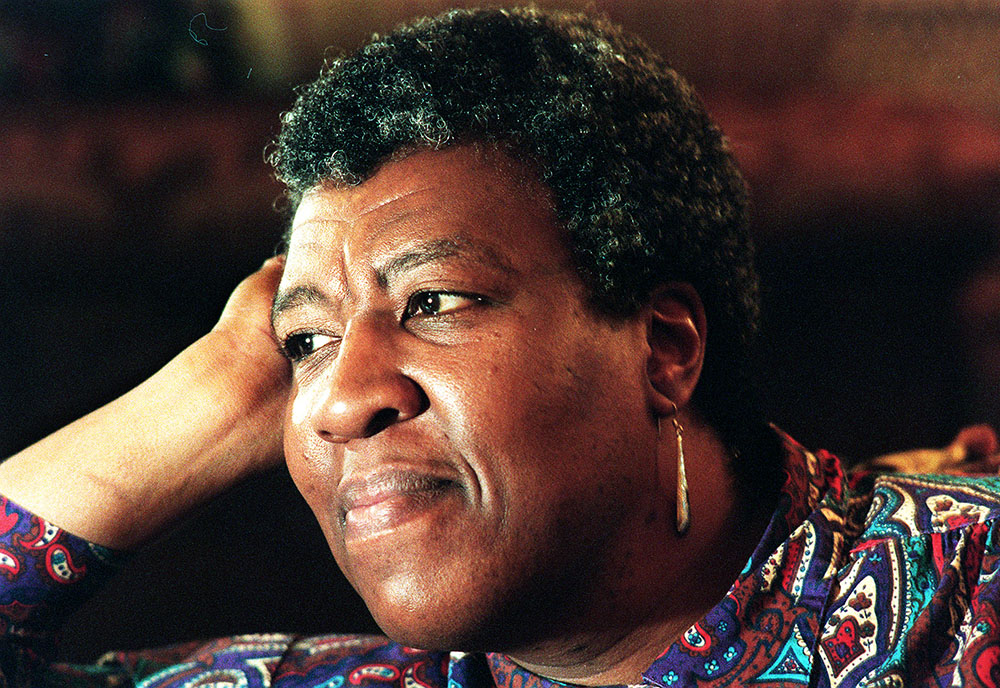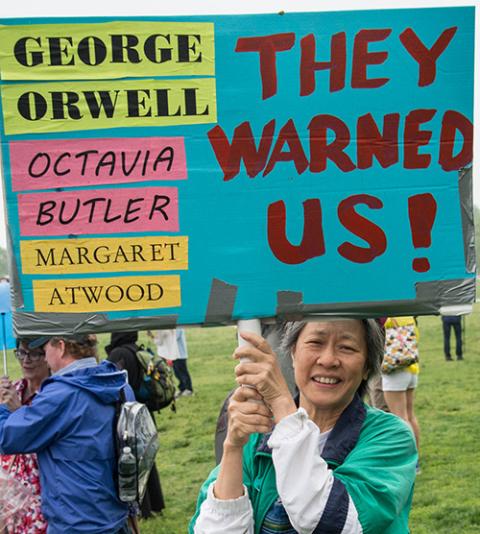
Science fiction author Octavia Butler in 1998 (Newscom/KRT/Milbert Orlando Brown)
America's belated embrace of author Octavia Butler has come at a fitting but disturbing time. Butler, a California native and MacArthur "genius" whose prescient oeuvre includes widely anthologized stories, more than a dozen novels and a Library of America volume, once wrote about a period of upheaval she dubbed "the Apocalypse" or, more bitterly, "The Pox."
This era's chaos was brought on by "coinciding climatic, economic, and sociological crises," and included the election of a demagogic president, who vowed to "make America great again." No wonder Butler — who died in 2006, when she was just 58 years old — hit bestseller lists at the height of the COVID-19 pandemic, just as social media blew up with merch proclaiming: "Octavia Butler Tried to Tell Us."
She certainly did, in provocative tales from a twilight zone all her own: an "Afro-futurist" middle ground between strict sci-fi and magic realism. Along the way, Butler influenced a generation of genre-bending writers, from Junot Diaz and Jonathan Lethem to Naomi Alderman, Colson Whitehead and Emily St. John Mandel.
Kindred and religion
Late last year, Hulu released an eight-episode TV series based on Butler's celebrated 1979 novel, Kindred, about a contemporary Black woman who periodically travels back in time to the 1830s, witnessing and experiencing the brutalities of slavery endured by her ancestors.

Mallori Johnson as Dana in "Kindred," a series adapted from the celebrated novel Kindred by Hugo Award-winner Octavia Butler (FX/Tina Rowden)
Television and movie producers, including J.J. Abrams, Issa Rae and Ava DuVernay, now have additional Butler adaptations in development — this to go along with graphic novels, art installations and musical compositions, all inspired by Butler, whose newfound prominence rests mainly on her status as a feminist who, as NPR host Terry Gross put it, "used science fiction to write about racial conflict, power, gender and sexual identity, and climate change."
Far less attention has been given to the degree to which Octavia Butler was also fascinated by religion in general, and Christianity in particular; as a source of conflict and oppression, but also as an inspiration — even necessity — for healing and liberation.
"I've met science fiction people who say, 'Oh well, we're going to outgrow [religion],' " Butler once said, retorting, "I don't believe that for one moment."
Post-apocalyptic 'parables'
This conviction of the necessity of religion is most evident in two linked Butler novels: Parable of the Sower (1993) and Parable of the Talents (1998), the very titles alluding to famous biblical passages. These modern-day gospel narratives begin in 2024 outside of Los Angeles with the confession of Lauren Oya Olamina, daughter of a stern Baptist minister: "My father's God stopped being my God."
Lauren's mother battled drug dependency while pregnant, leaving her daughter a "hyper-empath" capable of feeling the pain as well as pleasure of those around her. The ensuing chaos of "the Pox" scatters the Olamina family, forcing Lauren to venture across a landscape that is treacherously apocalyptic — yet not dissimilar from our own.
Advertisement
The U.S. of Butler's rendering had "lost no important war, yet it did not survive the Pox. Perhaps it simply lost sight of what it once intended to be, then blundered aimlessly until it exhausted itself."
Lauren's journey, along with the followers who join her and the dangers they confront, are outlined in a diary in which she develops a life — and survival — philosophy. "Sometimes naming a thing ... helps one to begin to understand it," Laura writes in an April 2025 entry. "The particular God-is-change belief system that seems right to me will be called Earthseed."
'Even a Catholic'
What Butler describes throughout the two "parable" novels is a philosophy along the lines of what Ross Douthat recently characterized as a "national impulse ... toward personalized revisions of Christian doctrine, Americanized updates of the Gospel." Lauren acknowledges that God can sometimes be "just another name for whatever makes you feel special and protected," and worries that she has come up with little more than some "scattered verses and aphorisms."
Still, as Butler biographer Gerry Canavan notes, sci-fi books and authors generally look upon religion "as a primitive artifact of the superstitious past." Yet Butler departs radically from this agnostic tradition. She refuses to dismiss, or condescend to, the human need for reverence, for guidance in attempting to reconcile the earthly and the otherworldly, the human and supernatural, empathy and dread.

Sign at the March for Science 2017 in Washington, D.C. (Wikimedia Commons/scattered1)
"Butler did not believe in utopia," E. Alex Jung wrote in a recent insightful Vulture profile, "but there is a deep strain of hope in how people engage with [Butler's] work: a desire to learn how to save ourselves from this mess we've made."
And religion is certainly part of this mess.
Followers of Butler's nationalistic president, Andrew Steele Jarret, are known collectively as "Christian America" (C.A.), and sometimes "form mobs and burn people at the stake for being witches," Lauren records in Talents. "Witches! In 2032! A witch, in their view, tends to be a Moslem, a Jew, a Hindu, a Buddhist, or, in some parts of the country, Mormon, a Jehovah's Witness, or even a Catholic."
C.A. devotees also take in children whose parents have been imprisoned or who've vanished — a stealth proselytization project with terrible parallels across history, from the abuses endured by indigenous Canadians at religious schools, to "slum" immigrants in U.S. cities shipped to farms on so-called "orphan trains."
Butler refuses to let such authoritarian Christians have the final say. She makes a powerful case for, if you will, keeping the faith.
From Muhammad to Jesus
Lauren's journey, and her diaries, ultimately echo any number of faith or theological traditions. She studied the life and times of Muhammad, while the trials and tribulations of the early Christian "Jesus movement" also resonate throughout the novels. Characters debate the finer points of theology, language and leadership. There is also persecution — particularly gruesome in Talents — and imprisonment at the hands of ruthless authorities.
Amid all this, small but devoted communities flourish, drawn to Earthseed's efforts to reconcile our best and worst impulses, its emphasis on environmental harmony and embrace of relentless change.
"All that you touch, you change. All that you change, changes you. The only lasting truth is change," reads what may well be Earthseed's central belief, while another flatly declares: "God is change." Some Catholics may well shudder at the implications of such an idea. Others also might, if they have seen the consequences of rigid resistance to change.
Similarly provocative questions are raised by Earthseed's vision of life beyond this planet, its followers "preparing to fall away from the parent world ... to take root in new ground ... fulfilling [life's] purpose, its promise, its Destiny."
In the 'stars'
The end of Talents — a journey to "the stars," on a ship called the Christopher Columbus — may not be Butler's strongest authorial moment. But keep your eye on her magnificent gnostic forest, rather than its occasional ill-nourished tree. Also keep in mind that tenets of the world's major religions related to the afterlife or the prophets, salvation or damnation, are best appreciated with minimal scrutiny.
Overall, Butler's "parables" are uncompromising visions of how we created a cosmic mess — but also what we need to start cleaning up.
Along the way, we see our own faiths, their traditions and stories, with new eyes. And what's more sci-fi than that?







